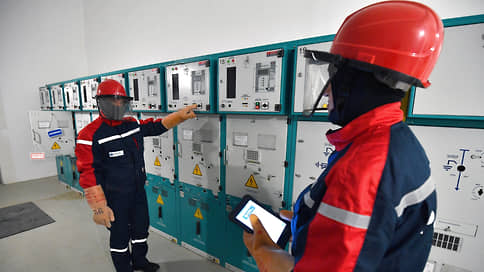Nets stretched through the court – Newspaper Kommersant No. 19 (7464) dated 02.02.
[ad_1]

The federal program to consolidate small private grid companies may run into difficulties. The courts in the dispute between Rosseti and the Ingush Energoinvest concluded that the consolidator is obliged to pay the market price for the use of other people’s assets, even if it does not have a lease agreement. The decision could lead to losses for the consolidator and increase in tariffs, as well as strengthen the position of private networks in the process of finding buyers, analysts say.
A large grid company, when consolidating small organizations, is obliged to pay for the uncontractual use of other people’s electricity networks and cannot always compensate for the loss of electricity in the networks it uses. The courts came to such conclusions after considering a dispute between Rosseti and the Ingush company Energoinvest, which arose against the backdrop of a program to consolidate territorial grid organizations (TSOs).
Rosseti and the authorities of Ingushetia have an agreement on the consolidation of TCO, so in 2018, immediately after the purchase of grid assets, Energoinvest decided to lease them to the state holding. Energoinvest did not have the status of a TCO and did not have revenue from electricity transmission. Negotiations dragged on, and the lease was never concluded.
Rosseti was the first to file a lawsuit against Energoinvest demanding to recover 1.35 billion rubles from it as the owner of the power transmission line. for compensation of technological losses of electricity in its networks for 2019. But Energoinvest filed a counterclaim to recover fees for the non-contractual use of its power lines. Arbitration courts of three instances rejected the claim of “Rosseti”, and the counterclaim of “Energoinvest” was satisfied. The courts recognized that a subsidiary of Rosseti actually owned the power grids of Energoinvest for 20 months without a lease agreement and must pay 383.77 million rubles. for their use. The price was calculated by involved experts. The Supreme Court (SC) in October 2022 refused to review the outcome of the dispute and did not refer the case to the Economic Board on the complaint of Rosseti. In parallel, Rosseti filed a second lawsuit against the company to recover losses for 505 million rubles. for 2020–2021: at first, the state holding lost the dispute, but then the cassation sent the case back for a new trial, the hearing is scheduled for February 9.
Disputes about the recovery of losses in networks are not uncommon, and the courts usually follow one approach in interpreting the law – the owners of electric grid property must pay for electricity losses, says NSP lawyer Sergey Bakhmisov. Here, the court decided that Energoinvest was only the legal owner, and Rosseti themselves were the actual owner (tenant) of the disputed section of the networks, which is why they should bear these costs, the lawyer adds. In the definition of the Supreme Court of October 6, 2022, it was separately emphasized that Rosseti North Caucasus “under various pretexts” evaded concluding an agreement, although Energoinvest offered to lease objects to them for 2.7 million rubles. per month, which is “significantly below market value.”
In Rosseti, they told Kommersant that, in their opinion, the courts considered the cases when the norms of the law were incorrectly applied, and the Supreme Court did not consider the case on the merits. Recently, Rosseti North Caucasus sent a complaint to the chairman of the Supreme Court, asking that the case be referred to the collegium for review. The state holding notes that due to “incorrect interpretation of the law, negative judicial practice is being formed in the qualification of relations between grid companies and other owners of grids.”
It is difficult to accurately estimate the amount of claims for the use of other people’s networks, which their owners can bring against Rosseti. In the reports of Rosseti, there is no data on how often the state holding does not enter into lease agreements with TSOs during consolidation. According to a study by the RANEPA, Rosseti, during consolidation until mid-2019, leased about 46% of the consolidated objects, bought 16.6%, and took about 6.6% for temporary use, including “gratuitous”.
The court decision contains no formal obstacles to the consolidation of TSOs, they say in the Community of Energy Consumers: “It’s another matter that now it will be almost impossible to get other people’s networks for nothing, and tariff restrictions will not allow you to immediately take into account the fair price of renting or buying networks in the tariff. The pace of consolidation could drop sharply, and in addition, there could be a lot of such disputes.”
The decision of the court can indeed have a negative impact on the process of TCO consolidation. In particular, the recognition of the actual non-contractual lease and the establishment of the market price of ownership in court may lead to losses for the consolidator, and an increase in the cost of renting small TSOs will become an additional factor for the growth of tariffs, notes Sergey Sasim from the Institute of Economics and Regulation of Infrastructure Industries of the National Research University Higher School of Economics. In addition, the court considered repairs to be one of the proofs of the actual ownership of assets: large electric networks will now be less motivated to eliminate accidents on other people’s power lines without lease agreements, the expert argues.
However, the controversial aspects of consolidation can be partially resolved after the adoption of the law on the introduction of the status of a backbone TSO: the bill does not imply market compensation for the use of small organizations, the amount of compensation is supposed to be limited to the amount of mandatory taxes (property tax and land tax), Sergey Sasim explains. At the same time, the court decision may strengthen the negotiating position of the owners of grid companies that have lost their TSO status in the process of finding a buyer.
[ad_2]
Source link





